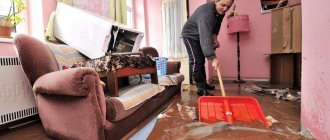Less and less often, a situation arises when a riser bursts in an apartment in an apartment building. There may be many reasons for this event, but who will be responsible and who will have to pay for the damage remains a question, because the damage that can be caused to property is very serious. We will answer these questions in the next article.
Main reasons for the breakthrough
Why is this problem even possible within a modern apartment building: there may be several reasons in this case, however, the main ones are:
- wear and tear of existing equipment in the apartment;
- untimely statement by a resident about poor-quality or inappropriate work of existing communications;
- careless use of communications;
- neglect of the norms and rules for the operation of common property.
As a result, pipes with hot or cold water supply break. As a result, the supply of one or another resource to the premises is limited, and neighbors are flooded.
Who should compensate for damage from flooding if the heating battery bursts?
The heating system in the defendant’s apartment has been functioning unchanged since the house was built in 1985. The defendant and the previous residents regularly and fully paid for utilities, which included the costs of maintaining and repairing common property. Clause 3, Part 1, Art. 36 of the Housing Code of the Russian Federation establishes that the common property in an apartment building includes roofs, enclosing load-bearing and non-load-bearing structures of a given house, mechanical, electrical, sanitary and other equipment located in a given house outside or inside the premises and serving more than one room . According to paragraphs 5, 6 of the Rules for the maintenance of common property in an apartment building, approved by Decree of the Government of the Russian Federation of August 13, 2006 N 491, the common property includes in-house engineering systems of cold and hot water supply and gas supply, consisting of risers, branches from risers to the first shut-off device located on the branches from the risers, the specified shut-off devices, collective (common house) cold and hot water metering devices, the first shut-off and control valves on the branches of the intra-apartment wiring from the risers, as well as mechanical, electrical, sanitary and other equipment, located on these networks. The common property includes an in-house engineering drainage system, consisting of sewer outlets, fittings (including bends, transitions, pipes, revisions, crosses, tees), risers, plugs, exhaust pipes, drainage funnels, clearings, branches from risers to first butt connections, as well as other equipment located in this system. The common property includes an intra-house heating system, consisting of risers, heating elements, control and shut-off valves, collective (common house) heat energy metering devices, as well as other equipment located on these networks. Thus, from the literal interpretation of clauses 5 and 6 of the Rules, it follows that the common property of the house includes hot and cold heating systems and other systems located inside the apartment or non-residential premises up to the first disconnecting device. Conversely, the heating system of the house, including radiators located inside the apartments, belongs to the common property of the house. This interpretation was confirmed in the letter of the Ministry of Regional Development of the Russian Federation dated 09/04/2020 N 16273-SK/07.
Hello. Our heating battery burst. The battery is new, the pipes are new. Major repairs were done 5 years ago by the management company. As a result, the neighbors below were flooded. Are we to blame in this case? We tried to negotiate with the neighbors peacefully. We bought wallpaper for both the ceiling and the walls. But they want more. But they had an old renovation. All the wallpaper didn't hold up well. What should we do in this case?
This is interesting: In How Many Years Can You Return 13 Percent From a Home Purchase?
If a riser bursts in an apartment, who is to blame?
The person who is responsible for what happened is determined very simply in accordance with the rules of the Housing Code. To do this, first identify the section of water supply communications where the breakthrough occurred. The next step is to determine the culprit of the incident:
- Breakthrough to the cut-off device. If a pipe with hot or cold water is damaged in the area before the shut-off device, then the Homeowners Association (HOA) or housing and communal services will be to blame for the event. It is these bodies that will be required to compensate for the damage caused.
- Gust after the cutting device. In situations where a burst is detected in the area after the shut-off device, responsibility rests entirely with the homeowners - your neighbors. Repair work to restore the damage caused will have to be carried out at the expense of the tenant.
In some situations, in case of serious damage, repairs may be carried out at the expense of monthly payments from residents for major repairs.
Who is guilty
If the battery burst and you flooded your neighbors, this does not mean that you are the culprit of this incident. The heating system in the house is the property of the company that installed the system. If the radiators turn out to be of poor quality, then the fault lies with the utility service. However, in most cases you will be to blame.
- This option does not work if you replaced the pipes and radiators yourself. Battery replacement is common in older homes. The owners decide to replace the already outdated batteries with more modern and stylish radiators.
- Responsibility lies with the utility service if you are not the owner of the property, but live in it under a social tenancy agreement. If you have privatized housing, then all responsibility lies with you. Russian legislation states that it is the homeowner who must independently monitor the serviceability of the heating system.
If you are the owner of an apartment, you must monitor the condition of the batteries. If they need to be replaced, you must do so as the utility company does not know when your radiators are due for renewal. At the same time, you can use their services by paying for the work.
You might think that in any case you will have to answer for a battery leak, but sometimes the blame falls on third parties. For example, the radiator is defective, the plumber did his job in bad faith, making mistakes during installation or not performing pressure testing. In such situations, you cannot say that you are to blame. The main thing is to prove that the heating device was defective. To do this, you should save all receipts from stores so that you have evidence in the future.
You will also need to conduct an examination and prove that this device was defective and you did not make a mistake during installation. You must always sign a contract with the plumber, and in the future you will also be able to prove that he did his job in bad faith.
Important! Without documentary evidence, you automatically become the culprit of the incident. You will have to pay for repairs to your neighbors and replace the damaged radiator with your own money.
What to do if a riser breaks
Actions in circumstances where you flood your neighbors due to a burst riser will vary depending on whether the apartment is privatized or not. This aspect is drawn attention to by Decree of the Government of the Russian Federation No. 491 of 2006. Also, information about who is to blame and how to act in such a situation can be found in the Housing Code or obtained by independently contacting the Management Company.
Privatized apartment
In a privately owned apartment, in the event of a break in the risers, the following features must be taken into account:
- payment for major repairs is made by the owner within the framework of common property; in the future, funds for the restoration of communications can be taken from this reserve;
- if a riser leaks, which is located on the territory of the apartment, then it is also necessary to understand that this element is a common one, and the responsibility for its restoration lies with the management company with which the contract was concluded;
- In case of flooding, damaged or damaged communications must be repaired by the HOA or management company with which the corresponding agreement has been concluded.
To prevent a riser with cold or hot water from bursting, utility workers regularly check the risers for wear resistance and suitability for further use. If for some reason a citizen refuses to allow employees into his home for inspection, it means that he will be to blame for a pipe rupture during an emergency.
Non-privatized apartment
The story with a non-privatized apartment is much more complicated: here it can be very difficult to find who is responsible for the flood. The following details must be taken into account:
- tenants, if they flooded a neighbor, will be required to take responsibility if experts can prove that the flood was the fault of the tenants;
- in these circumstances, specialists must establish the reason why the riser with water began to leak, and based on this reason, the possibility of establishing the fault of the parties is considered;
- in some circumstances, the interested party has to resort to the help of a lawyer to understand the situation and identify the culprit.
In circumstances where the risers leaked precisely through the fault of the tenant, he is obliged to take full financial responsibility for paying for the damage caused to private and common property.
Premises in the housing cooperative department
Owners of apartments that are under the control of the housing complex believe that since the apartment is not fully their property, in the event of a breakthrough they will also not be held responsible. In fact, this is not true at all. Difficulties with an apartment under the jurisdiction of a residential complex are resolved by the Housing Code of the Russian Federation. He says that if a riser breaks in an apartment of this type, the residents will be held responsible for this in accordance with the same rules that apply to residents of privatized living space.
Flooding of neighbors as a result of a burst battery (pipe): who is responsible?
However, when the heating systems were replaced independently, without inviting a repairman from the building management (and the application must be official, and not by directly contacting an employee), then the owner of the apartment becomes the culprit. To avoid such a situation, for any replacement of pipes it is necessary to submit an official application to the management organization and register it properly. After the work, a certificate must be issued, which is signed by the master on his part, and the owner of the apartment on his part. In this case, in the event of a break, the utility organization servicing the house will be responsible.
We recommend reading: Giving up your share in an apartment in favor of a relative
When inspections are performed, employees must inspect heating and plumbing systems. But without the consent of the owner, they will not be able to enter the premises. Therefore, if the owner did not allow the utility worker to carry out the inspection, then in the event of an accident he will be to blame and, therefore, he will also have to pay him for the damage caused to the neighbors below. But if a problem is discovered during the inspection, it will be corrected at the expense of the management company.
Where to go in an emergency
With questions about what to do if the risers in the apartment burst, who is to blame, as well as what to do in the described case and from whom to demand responsibility, you can go to the following organizations:
- Management Company. Your management company should be the first authority to notify when an emergency occurs. This is important, since it is likely that it will be the management company that will compensate for the damage caused. Another option is housing and communal services. You can also contact two of these authorities at once for a speedy response: this measure is especially important in serious emergency situations.
- Sometimes irresponsible management companies or housing and communal services generally refuse to respond to residents’ complaints. In these circumstances, it is necessary to contact local authorities or the State Housing Inspectorate. To apply, you must clearly formulate and draw up a collective complaint with a detailed analysis of the problem and a description of the existing problem.
If, while waiting for the management company’s reaction, residents had to restore the damage and carry out repairs at their own expense (although this should have been done by the responsible authorities), then they have the right to demand full reimbursement of costs in court. Such legal disputes usually end in victory for homeowners.
Thus, it can be argued that if a riser bursts in an apartment, the tenant’s first task is to try to stop the spread of water on his own and contact the management company as soon as possible to solve the problem. There is no need to worry, if you are not the culprit of the impulse, then you will not have to bear responsibility.
A heating pipe burst: who is to blame and how to document the consequences
It would seem that after the end of the heating season, the heating system cannot perform any “tricks”, since the coolant does not circulate in the system, therefore, there is no reason for the destruction of communications. And if in the summer someone tells you that a heating pipe in the house has burst, then this may well be the case.
- notify the management company about the incident;
- record the fact of the accident by drawing up a flooding report in the proper form with the involvement of HOA or housing office employees, as well as neighbors, in its preparation;
- record the consequences of the flood on video and with a camera;
- start saving personal belongings.
We recommend reading: How to Get Money for Buying an Apartment from the Tax Office
The battery burst and the neighbors were flooded, who is to blame?
Good afternoon, please provide a consultation. No one lives in my apartment, at night the battery burst and flooded the neighbors below on the 1st and 2nd floor (I have the third floor), they were able to find me and notify me about this only at 10-00 o’clock in the morning (according to them, it was flooded from 3 o’clock in the morning), They called a plumber from the housing and communal services, he blocked the riser. Upon inspection, I discovered a burst aluminum battery (a gap of about 2 centimeters). Now the neighbors are demanding compensation for material and moral damage, tell me what the right thing to do in this situation is and whether this is entirely my fault.
Hello. You need to call a service organization and draw up a report indicating the damaged property and the reasons for the flooding. Who is to blame in your case is a controversial issue, since current legislation and judicial practice have established the following. The management organization is responsible for the maintenance of common property until the disconnection device for intra-apartment property, i.e. if there is a valve on the pipe leading to the battery, then you are responsible for the battery and the consequences caused by its malfunction, and if not, then the management organization is responsible for the flooding.
This is interesting: What is the meaning of who issued the STS










